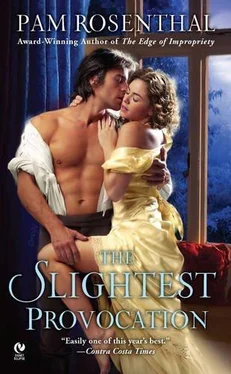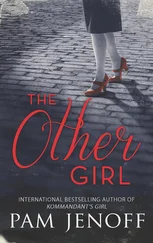After church, he’d enjoyed the well wishes and congratulations from people in the neighborhood. Good to meet Colonel Halsey, who led the militia; they’d be speaking next week. And everyone had chuckled when he’d shaken the hand of the child he’d terrorized from behind the lectern. Of course, Mrs. Grandin and that pretty daughter had come up to greet him. Too bad: he’d wanted a few more words with Halsey. But Susanna had been anxious about Wat. He’d hastened to take her back to Rowen.
“He’ll be very happy when I tell him how beautifully you read it.” Kit handed her into the carriage a bit charily.
Still, she wasn’t such a bad sort. Fearful of unconventionality, in the past she’d stayed as far as she could from him-odd now to be thrown together, to have to make halting conversation.
Growing up in the glow cast by a brilliant, beautiful mother, Kit had always assumed Wat had married Susanna because he’d been told to. Certainly he couldn’t have wanted to marry this small, timid, rusty-haired woman, with her pursed mouth and jutting chin.
But today he found himself admiring the patient slowness with which she spooned beef jelly between his brother’s tremulous lips, heedless, as she wiped it from his shirtfront, of the bit that stained the lace cuff of her gray gown.
“It must be awkward for you,” she told him after Wat had been put to bed for a rest, “with Lady Christopher in the neighborhood. Still, now that you’re here, perhaps she’ll return to London.”
He suppressed a smile. Whatever her newly revealed strengths, Susanna clearly didn’t know Lady Christopher.
“I hadn’t realized you received her family nowadays,” he said.
“Times change,” she said. “The estate boundaries are settled, which was the main thing. Mrs. Grandin is more liberal in her opinions than I like, but she does her best. And Mr. Grandin was quite what he should be.”
How strange to be having this conversation, as though he were also what he should be. Perhaps he was now. Part of him enjoyed it-the same part that had once delivered messages across enemy lines-while part of him expected to be arrested any minute as a foreign agent.
“And then, of course, I quite dote upon Miss Grandin,” his sister-in-law was saying. “She sometimes comes to call of her own accord, and I daresay I’ve had a hand in improving her. She’s not at all the forward, hoydenish, bluestocking sort of creature one might have supposed her to turn out, given her mother’s family…” She stopped, blushed. “I beg your pardon, Christopher.”
“Not at all.” He wouldn’t have expected anything else.
Though what was unexpected was his sadness, that the estate borders were no longer ambiguous, social intercourse more amiable and better regulated between the two families. There’d been something magical about sharing a secret friendship in the place where the boundaries ran together.
“But you’ll want to get back to the magistrate’s papers,” she was saying now, leading him out of the dining room and down a corridor.
Rather a dreary little office. They’d moved the papers down from the tower room, Susanna had told him, so that Wat might be able to work with Kit on them when he recovered a bit more. She’d made a very small pause before articulating the word when.
Still, he was glad not to be working in the tower. The old marquess would summon you up there to pronounce judgment on you. He’d sit at his writing desk and you’d stand in front of it like a supplicant.
He wouldn’t exactly get angry. You’d have to be worth a lot more than you were, his manner implied, to make him angry. Mostly he’d be bored, mildly amused, and visibly hankering to be out riding or fishing. As when Kit had been sent down from school. Or when he and Mary had returned from Gretna.
Handing over the marriage papers, to be registered in the parish and then tucked away in the family files for the solicitors and genealogists.
“Mary Artemis? Couldn’t give the girl a decent English name, eh? Quite the sort of thing one would expect of the Penleys.”
“Yes, your lordship. Here’s where we signed.”
“I can see that.”
“And I think her name is beautiful. Your lordship.” After reaching a certain age, Kit had always called him your lordship. The old man didn’t seem to mind. He certainly never asked to be called anything else, which Kit supposed made sense under the circumstances.
He’d gotten a scowl out of him anyway, with that comment about her name being beautiful. A small victory in those days.
Surprising how vividly he could remember it. Physical proximity, he expected, a sense of place. Smell of the air, rustle of weeds and hedges, weight of looming skies.
Walking the footpath from Grefford, it had been as though she’d been by his side. As though he could still make out their younger shapes, pressed into the grass, molded into the heavy air that meant a storm was on the way.
But she’s not at your side. And doesn’t want to be.
Time to get on with business.
The downstairs office contained a safe, which held instructions on how to communicate with Traynor, the informant. Messages in a hollow tree. He’d walk out later, leave a note telling the man that he’d be receiving the reports from now on. Paying for them, too.
Interesting stuff. He’d read some of it last night; finishing it up now, he felt something of the excitement one felt decoding a military communication-disparate elements suddenly cohering into a story. In truth, rather a frightening story. It vindicated everything Wat had been writing to him and matched exactly what the Committee of Secrecy had been saying.
To the Right Honorable Magistrate &c &c &c with the Compliments of his Most Loyal Servant in the Matter of…
Traynor was clearly no professional. His wordy reports on the doings of the local Parliamentary Reform Club were written in neat if wobbly writing, but one had rather to hack through an overgrowth of irrelevancies to get to the point.
The meeting took place in the Wheel… There were twenty-three persons present…
Though, in fact, the local malcontents were meeting less frequently at taverns these days and more often in barns, as new laws against seditious meetings were handed down from London. But on an occasion when they still came together at a place that served food and drink, Mr. Traynor seemed to feel it incumbent to begin with a description of the various members’ suppers-who’d had chops and who’d had ale, and whether they had to borrow the money to pay for it. The first pages of certain reports would thus be bathed in a glow of fellowship, the warmth of a public hearth. Reading them, Kit felt sometimes as though he were back in uniform, drinking and joking with his men.
Until one got to the real stuff: In Lancashire and Nottingham they were all ready… Sheffield Barracks to be attacked and the guards and soldiers made prisoners…
In one of Wat’s last communications to Kit in Paris, he’d written that Sir Charles Benedict, over near Nottingham, had been receiving extremely similar reports from his informant.
Write to Benedict. Find out more.
He gazed out the window across the velvety lawn at Susanna wheeling his brother’s invalid chair in front of a stand of rhododendron. All calm and domestic peace, or so one might think.
Even as late as last February, Kit had doubted the existence of a conspiracy.
The letters Wat sent him last year had been singularly unimpressive. There’d been just as many meetings for Traynor to report on-more of them, perhaps, after the harvest had turned out so miserable. Snow on the ground as late as June; hunger and anger-though at least they’d been spared the food riots some districts had endured. Invective had flowed from the spy’s reports like small beer at a village festival: the sort of extravagant, furious, gaseous oratory Kit imagined a poor man might glory in when he’d had some drink in him.
Читать дальше












